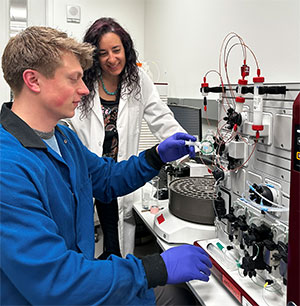UW Scientists Use Tardigrade Proteins for Human Health Breakthrough
March 20, 2023

UW student Maxwell Packebush, of Littleton, Colo., works with Silvia Sanchez-Martinez, a senior research scientist, to purify one of the tardigrade proteins used in a study showing that the proteins can be used to stabilize an important pharmaceutical for people with hemophilia and other conditions without the need for refrigeration. (Thomas Boothby Photo)
University of Wyoming researchers’ study of how microscopic creatures called tardigrades survive extreme conditions has led to a major breakthrough that could eventually make life-saving treatments available to people where refrigeration isn’t possible.
Thomas Boothby, an assistant professor of molecular biology, and colleagues have shown that natural and engineered versions of tardigrade proteins can be used to stabilize an important pharmaceutical used to treat people with hemophilia and other conditions without the need for refrigeration — even amid high temperatures and other difficult conditions. The findings are detailed today (Monday) in Scientific Reports, an online, open access journal from the publishers of Nature.
The pharmaceutical, human blood clotting Factor VIII, is an essential therapeutic used to treat genetic disease and instances of extreme bleeding. Despite being critical and effective in treating patients in these circumstances, Factor VIII has a serious shortcoming, in that it is inherently unstable. Without stabilization within a precise temperature range, Factor VIII will break down.
“In underdeveloped regions, during natural disasters, during space flight or on the battlefield, access to refrigerators and freezers, as well as ample electricity to run this infrastructure, can be in short supply. This often means that people who need access to Factor VIII do not get it,” Boothby says. “Our work provides a proof of principle that we can stabilize Factor VIII, and likely many other pharmaceuticals, in a stable, dry state at room or even elevated temperatures using proteins from tardigrades — and, thus, provide critical live-saving medicine to everyone everywhere.”
Measuring less than half a millimeter long, tardigrades — also known as water bears — can survive being completely dried out; being frozen to just above absolute zero (about minus 458 degrees Fahrenheit, when all molecular motion stops); heated to more than 300 degrees Fahrenheit; irradiated several thousand times beyond what a human could withstand; and even survive the vacuum of outer space. They are able to do so, in part, by manufacturing a sugar called trehalose and a protein called CAHS D.
According to the research paper, Boothby and his colleagues fine-tuned the biophysical properties of both trehalose and CAHS D to stabilize Factor VIII, noting that CAHS D is most suitable for the treatment. The stabilization allows Factor VIII to be available in austere conditions without refrigeration, including repeated dehydration/rehydration, extreme heat and long-term dry storage.
The researchers believe the same thing can be done with other biologics — pharmaceuticals containing or derived from living organisms — such as vaccines, antibodies, stem cells, blood and blood products.
“This study shows that dry preservation methods can be effective in protecting biologics, offering a convenient, logistically simple and economically viable means of stabilizing life-saving medicines,” Boothby says. “This will be beneficial not only for global health initiatives in remote or developing parts of the world, but also for fostering a safe and productive space economy, which will be reliant on new technologies that break our dependence on refrigeration for the storage of medicine, food and other biomolecules.”
Boothby and other researchers hope that their discoveries can be applied to address other societal and global health issues as well, including water scarcity. For example, their work might lead to better ways of generating engineered crops that can cope with harsh environments.
Re-posted from: University of Wyoming https://www.uwyo.edu/uw/news/2023/03/uw-scientists-use-tardigrade-proteins-for-human-health-breakthrough.html